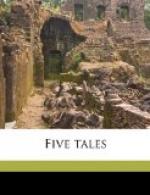turning away, he went up the lane which smelled of
the night and cowdung and young leaves. In the
straw-yard he could see the dark shapes of cattle,
broken by the pale sickles of their horns, like so
many thin moons, fallen ends-up. He unlatched
the farm gate stealthily. All was dark in the
house. Muffling his footsteps, he gained the
porch, and, blotted against one of the yew trees,
looked up at Megan’s window. It was open.
Was she sleeping, or lying awake perhaps, disturbed—unhappy
at his absence? An owl hooted while he stood
there peering up, and the sound seemed to fill the
whole night, so quiet was all else, save for the never-ending
murmur of the stream running below the orchard.
The cuckoos by day, and now the owls—how
wonderfully they voiced this troubled ecstasy within
him! And suddenly he saw her at her window,
looking out. He moved a little from the yew
tree, and whispered: “Megan!” She
drew back, vanished, reappeared, leaning far down.
He stole forward on the grass patch, hit his shin
against the green-painted chair, and held his breath
at the sound. The pale blur of her stretched-down
arm and face did not stir; he moved the chair, and
noiselessly mounted it. By stretching up his
arm he could just reach. Her hand held the huge
key of the front door, and he clasped that burning
hand with the cold key in it. He could just see
her face, the glint of teeth between her lips, her
tumbled hair. She was still dressed—poor
child, sitting up for him, no doubt! “Pretty
Megan!” Her hot, roughened fingers clung to
his; her face had a strange, lost look. To have
been able to reach it—even with his hand!
The owl hooted, a scent of sweetbriar crept into
his nostrils. Then one of the farm dogs barked;
her grasp relaxed, she shrank back.
“Good-night, Megan!”
“Good-night, sir!” She was gone!
With a sigh he dropped back to earth, and sitting
on that chair, took off his boots. Nothing for
it but to creep in and go to bed; yet for a long while
he sat unmoving, his feet chilly in the dew, drunk
on the memory of her lost, half-smiling face, and
the clinging grip of her burning fingers, pressing
the cold key into his hand.
5
He awoke feeling as if he had eaten heavily overnight,
instead of having eaten nothing. And far off,
unreal, seemed yesterday’s romance! Yet
it was a golden morning. Full spring had burst
at last—in one night the “goldie-cups,”
as the little boys called them, seemed to have made
the field their own, and from his window he could
see apple blossoms covering the orchard as with a
rose and white quilt. He went down almost dreading
to see Megan; and yet, when not she but Mrs. Narracombe
brought in his breakfast, he felt vexed and disappointed.
The woman’s quick eye and snaky neck seemed
to have a new alacrity this morning. Had she
noticed?
“So you an’ the moon went walkin’
last night, Mr. Ashurst! Did ye have your supper
anywheres?”




